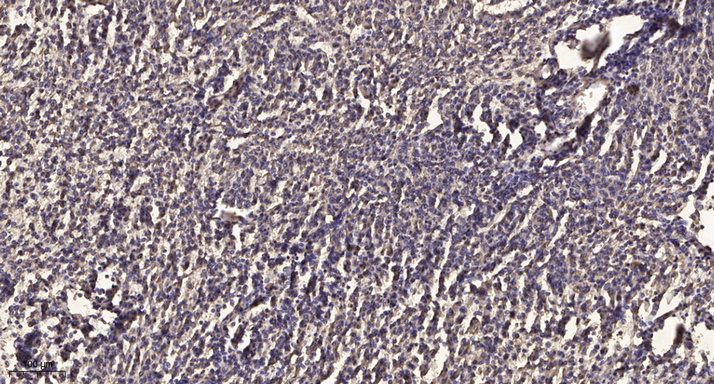Bcl-2 (phospho Thr74) Polyclonal Antibody
- Catalog No.:YP1121
- Applications:IHC;IF;ELISA
- Reactivity:Human;Rat;Mouse;
- Target:
- Bcl-2
- Fields:
- >>EGFR tyrosine kinase inhibitor resistance;>>Endocrine resistance;>>Platinum drug resistance;>>NF-kappa B signaling pathway;>>HIF-1 signaling pathway;>>Sphingolipid signaling pathway;>>p53 signaling pathway;>>Autophagy - animal;>>Protein processing in endoplasmic reticulum;>>PI3K-Akt signaling pathway;>>Apoptosis;>>Apoptosis - multiple species;>>Necroptosis;>>Adrenergic signaling in cardiomyocytes;>>Hedgehog signaling pathway;>>Focal adhesion;>>NOD-like receptor signaling pathway;>>JAK-STAT signaling pathway;>>Neurotrophin signaling pathway;>>Cholinergic synapse;>>Estrogen signaling pathway;>>Parathyroid hormone synthesis, secretion and action;>>AGE-RAGE signaling pathway in diabetic complications;>>Amyotrophic lateral sclerosis;>>Pathways of neurodegeneration - multiple diseases;>>Shigellosis;>>Salmonella infection;>>Toxoplasmosis;>>Tuberculosis;>>Hepatitis B;>>Measles;>>Herpes simplex virus 1 infection;>>Epstein-Barr virus infection;>>Human immunodeficiency virus 1 infection;>>Pathw
- Gene Name:
- BCL2
- Protein Name:
- Apoptosis regulator Bcl-2
- Human Gene Id:
- 596
- Human Swiss Prot No:
- P10415
- Mouse Swiss Prot No:
- P10417
- Immunogen:
- Synthesized phospho-peptide around the phosphorylation site of human Bcl-2 (phospho Thr74)
- Specificity:
- Phospho-Bcl-2 (T74) Polyclonal Antibody detects endogenous levels of Bcl-2 protein only when phosphorylated at T74.
- Formulation:
- Liquid in PBS containing 50% glycerol, 0.5% BSA and 0.02% sodium azide.
- Source:
- Polyclonal, Rabbit,IgG
- Dilution:
- IHC 1:100 - 1:300. ELISA: 1:10000.. IF 1:50-200
- Purification:
- The antibody was affinity-purified from rabbit antiserum by affinity-chromatography using epitope-specific immunogen.
- Concentration:
- 1 mg/ml
- Storage Stability:
- -15°C to -25°C/1 year(Do not lower than -25°C)
- Other Name:
- BCL2;Apoptosis regulator Bcl-2
- Molecular Weight(Da):
- 26kD
- Background:
- BCL2, apoptosis regulator(BCL2) Homo sapiens This gene encodes an integral outer mitochondrial membrane protein that blocks the apoptotic death of some cells such as lymphocytes. Constitutive expression of BCL2, such as in the case of translocation of BCL2 to Ig heavy chain locus, is thought to be the cause of follicular lymphoma. Alternative splicing results in multiple transcript variants. [provided by RefSeq, Feb 2016],
- Function:
- disease:A chromosomal aberration involving BCL2 may be a cause of follicular lymphoma (FL) [MIM:151430]; also known as type II chronic lymphatic leukemia. Translocation t(14;18)(q32;q21) with immunoglobulin gene regions. BCL2 mutations found in non-Hodgkin lymphomas carrying the chromosomal translocation could be attributed to the Ig somatic hypermutation mechanism resulting in nucleotide transitions.,domain:The BH4 motif is required for anti-apoptotic activity and for interaction with RAF-1.,function:Suppresses apoptosis in a variety of cell systems including factor-dependent lymphohematopoietic and neural cells. Regulates cell death by controlling the mitochondrial membrane permeability. Appears to function in a feedback loop system with caspases. Inhibits caspase activity either by preventing the release of cytochrome c from the mitochondria and/or by binding to the apoptosis-activati
- Subcellular Location:
- Mitochondrion outer membrane ; Single-pass membrane protein . Nucleus membrane ; Single-pass membrane protein . Endoplasmic reticulum membrane ; Single-pass membrane protein . Cytoplasm .
- Expression:
- Expressed in a variety of tissues.
- June 19-2018
- WESTERN IMMUNOBLOTTING PROTOCOL
- June 19-2018
- IMMUNOHISTOCHEMISTRY-PARAFFIN PROTOCOL
- June 19-2018
- IMMUNOFLUORESCENCE PROTOCOL
- September 08-2020
- FLOW-CYTOMEYRT-PROTOCOL
- May 20-2022
- Cell-Based ELISA│解您多样本WB检测之困扰
- July 13-2018
- CELL-BASED-ELISA-PROTOCOL-FOR-ACETYL-PROTEIN
- July 13-2018
- CELL-BASED-ELISA-PROTOCOL-FOR-PHOSPHO-PROTEIN
- July 13-2018
- Antibody-FAQs
- Products Images

- Immunohistochemical analysis of paraffin-embedded human meningioma. 1, Antibody was diluted at 1:200(4° overnight). 2, Tris-EDTA,pH9.0 was used for antigen retrieval. 3,Secondary antibody was diluted at 1:200(room temperature, 45min).



